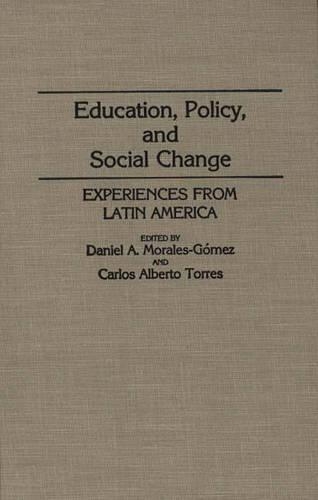
Education, Policy, and Social Change: Experiences from Latin America
(Hardback)
Publishing Details
Education, Policy, and Social Change: Experiences from Latin America
By (Author) Daniel A. Morales Gomez
By (author) Carlos Alberto Torres
Bloomsbury Publishing PLC
Praeger Publishers Inc
17th September 1992
United States
Classifications
Tertiary Education
Non Fiction
Politics and government
Social and ethical issues
Social welfare, social policy and social services
Social and cultural history
370.98
Physical Properties
Hardback
232
Description
The purpose of this collection is to examine the links among research, policy, and change in education in Latin America in the context of the relationships between the economy, politics, and the state in the 1980s. The case analyses discuss the challenges these societies face in education in their progression towards the 21st century. In its various sections, the book addresses the following questions: How did education respond during the 1980s to the major socio-political and economic changes that affected these countries How did the changes in the 1980s affect the relationships between education, society, and the state, and what lessons can be learned from the interaction of research and policy that may help in understanding the developmental role of education in the 1990s And is educational research and policy helping to improve the social condition of minorities in Latin America This volume should be of interest to scholars and policymakers in Latin American studies, educational research, and education policy and educational planning.
Reviews
.,."effectively argues that education and educational policy are interrelated with political and socioeconomic factors. This point is well illustrated using historical studies from various countries. The need for new educational theory and practice throughout Latin America is well supported in the individual chapters and in the conclusion. This book builds a good foundation for understanding how educational theory in Latin America evolved into what it is now, and gives guidance to the further research and new theories that are necessary to face the challenges of the 1990s."-Compare
.,."provides a good foundation for understanding how educational theory in Latin America has evolved into what it is now, and, collectively, the authors provide useful guidance research that is necessary to face the challenges of the 1990s."-Comparative Education
...effectively argues that education and educational policy are interrelated with political and socioeconomic factors. This point is well illustrated using historical studies from various countries. The need for new educational theory and practice throughout Latin America is well supported in the individual chapters and in the conclusion. This book builds a good foundation for understanding how educational theory in Latin America evolved into what it is now, and gives guidance to the further research and new theories that are necessary to face the challenges of the 1990s.-Compare
...provides a good foundation for understanding how educational theory in Latin America has evolved into what it is now, and, collectively, the authors provide useful guidance research that is necessary to face the challenges of the 1990s.-Comparative Education
The papers in this volume examine the links between research, policy, and change in education. It inquires into the relationships between the economy, politics, and the states and reviews the praxis of education in Latin American countries in the context of the development trends of the 1980s.-Educational Administration Abstracts
..."provides a good foundation for understanding how educational theory in Latin America has evolved into what it is now, and, collectively, the authors provide useful guidance research that is necessary to face the challenges of the 1990s."-Comparative Education
"The papers in this volume examine the links between research, policy, and change in education. It inquires into the relationships between the economy, politics, and the states and reviews the praxis of education in Latin American countries in the context of the development trends of the 1980s."-Educational Administration Abstracts
..."effectively argues that education and educational policy are interrelated with political and socioeconomic factors. This point is well illustrated using historical studies from various countries. The need for new educational theory and practice throughout Latin America is well supported in the individual chapters and in the conclusion. This book builds a good foundation for understanding how educational theory in Latin America evolved into what it is now, and gives guidance to the further research and new theories that are necessary to face the challenges of the 1990s."-Compare
Author Bio
DANIEL A. MORALES-GOMEZ is Director, Social Policy Program with the International Development Research Centre in Ottawa, Canada. He co-authored (with Carlos Alberto Torres) The State, Corporatist Politics, and Educational Policy Making in Mexico (Praeger, 1990). CARLOS ALBERTO TORRES is Assistant Professor of Education at the University of California at Los Angeles. He is the author of The Politics of Nonformal Education in Latin America (Praeger, 1990) and The Church, Society and Hegemony (Praeger, 1992).
